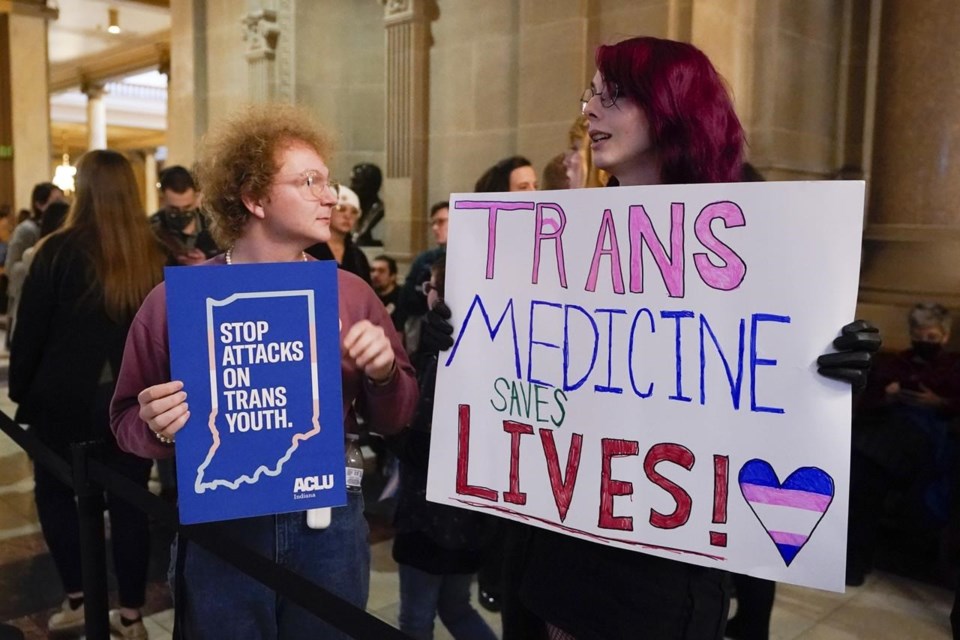INDIANAPOLIS (AP) — Indiana Republican state Senators voted Tuesday to advance a ban on all gender-affirming care for those under 18, the latest in this year's movement by conservative states aiming to limit the rights of transgender youth.
The bill passed the Senate 36-12, sending it to the House despite last week's contentious committee hearing that primarily featured testimony from vocal opponents. Witnesses said the types of care the bill would ban, such as hormone therapy and puberty blockers, is vital and often life-saving for trans kids.
“I’m not afraid to be who I really am anymore,” Damian Ryan, a 17-year-old trans teenager from Fishers, Indiana, said that day.
Proponents of the legislation, however, have voiced concerns about the number of gender-transition surgeries, which the bill would also ban, taking place in the state. The only Indiana hospital that performs such procedures told senators that doctors typically do not refer minors for those surgeries.
With respect to hormone therapy, Republicans who favor the bill have cited concerns that the treatments are irreversible, an idea medical providers have challenged.
“A child cannot understand the weight and permanency of these decisions,” said the bill's author, Republican Sen. Tyler Johnson, an emergency medicine physician from Leo-Cedarville, Indiana. “Given the pressures put on parents, the irreversible nature of these procedures and the unknown long-term effects, there’s no such thing as true informed consent.”
GOP Senate President Pro Tem Rodric Bray called the banned treatments “uncertain, unproven, and life-altering.”
“When it comes to either surgery or treatment by hormones or other things like that, I think you’re better off waiting until they get to be 18 and be able to make that determination themselves,” Bray told reporters Tuesday after the vote.
Senators advanced the proposed ban to the House on the last day they could have voted on it this session.
Nationally, state lawmakers are approving extensive measures against LGBTQ individuals this year, from bills targeting trans athletes and drag performers to ones limiting gender-affirming care. Indiana's legislative session has been largely defined by LGBTQ issues, especially those affecting schools and young people.
Earlier Tuesday, Republican Mississippi Gov. Tate Reeves signed a bill to ban gender-affirming care in the state. Utah's Republican governor also signed a ban on such care in January, while judges have temporarily blocked similar laws in Arkansas and Alabama.
Overall, state lawmakers in the U.S. have introduced at least 150 bills affecting transgender people this year — the most ever, according to the Human Rights Campaign.
“I would argue that we’re bullying children,” Indiana Democratic Sen. Shelli Yoder said Tuesday. “A group of adult legislators are targeting kids because of who they are.”
Trans students in K-12 schools have also been a focus point for Indiana legislators this session. Last week they approved a bill that would require public school teachers to tell parents about students’ social transitions and pronoun changes.
Some worry that the House proposal, which the Senate could take up, would erode student-teacher trust and force children to come out to their parents prematurely.
Indiana state lawmakers also pushed ahead a separate bill on Tuesday that would remove a legal defense for public school libraries when educators are accused of distributing texts harmful to students. Critics have said it could lead to banning books that explore racism or LGBTQ issues.
The bill's author, Republican Sen. Jim Tomes, said parents brought several inappropriate books to his attention — among them “Gender Queer: A Memoir” by Maia Kobabe, a coming-of-age story about gender and sexuality, which was among the most targeted books in 2022, according to the American Library Association.
“I dearly hope that there’s no one in this room that would have some fuzziness about those books,” Tomes said during Tuesday's debate.
Democrat Sen. Andrea Hunley expressed concern about distilling books down to their “obscene” parts and preventing school staff from arguing that the texts have “educational” value.
"I’m worried that underneath what we currently have here in this legislation, that a teacher could be prosecuted for that,” she said.
__
Arleigh Rodgers is a corps member for the Associated Press/Report for America Statehouse News Initiative. Report for America is a nonprofit national service program that places journalists in local newsrooms to report on under-covered issues. Follow her on Twitter at https://twitter.com/arleighrodgers
Arleigh Rodgers, The Associated Press


